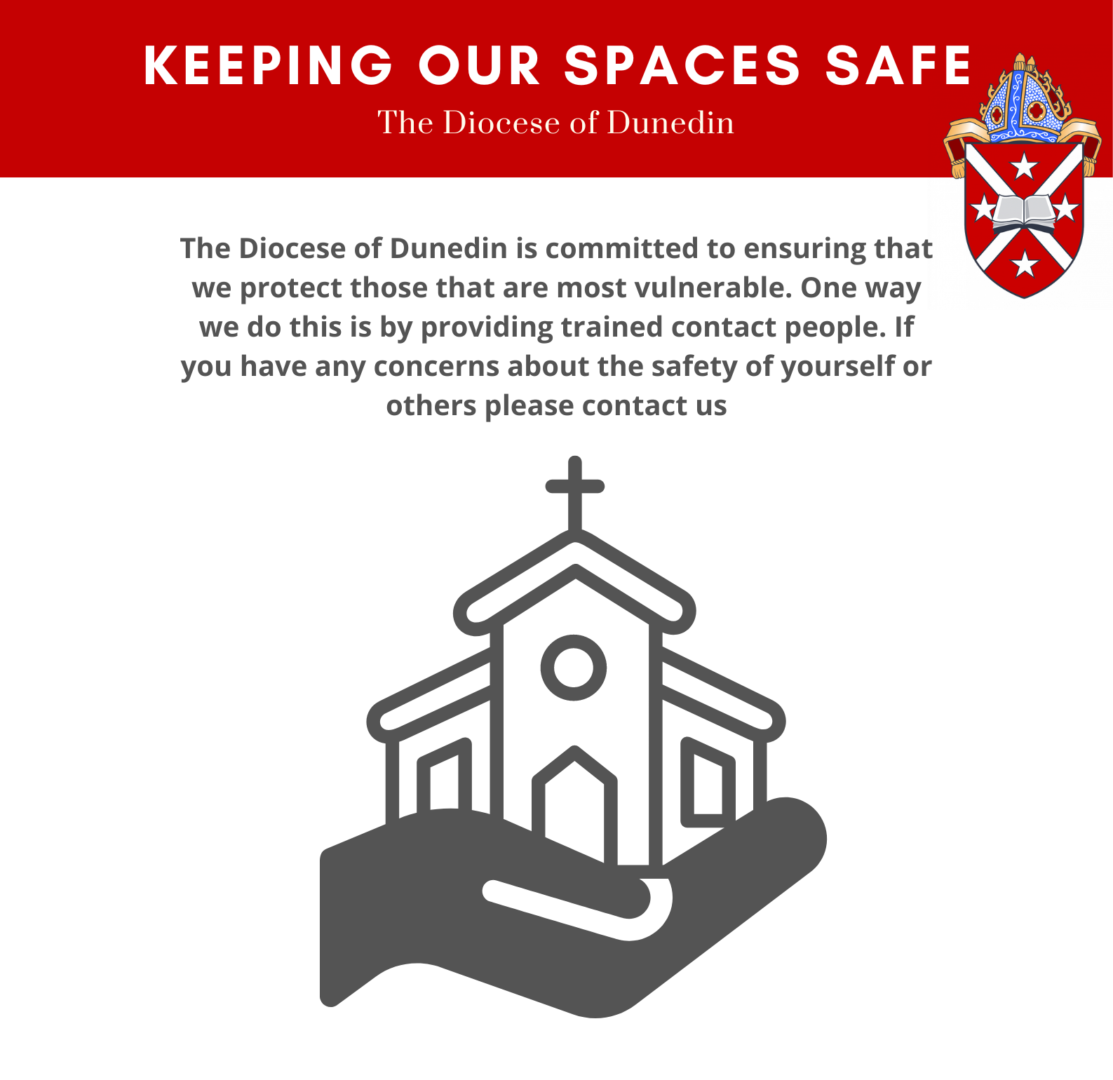Safeguarding and Abuse
Safeguarding
The Anglican Diocese of Dunedin believes that we have a responsibility to promote the welfare of all children, young people, and vulnerable adults, and to keep them safe. We are committed to protecting them from all forms of abuse. The Church is called by God to love, to stand alongside, and to advocate for, those at the margins, those less powerful, and those without a voice in our society.
How we will keep Children, Young People and Vulnerable Adults Safe
The Diocese of Dunedin recognises that Safeguarding is a proactive approach that aims to prevent the harming of children, young people or vulnerable adults. The responsibility to create a safe environment applies to every person regularly assisting in ministry in this Diocese. This includes all clergy, laity, paid, and/or volunteer leaders.
We have a comprehensive Safeguarding Policy that outlines the ways that we practice safeguarding in the Diocese. We also require anyone in leadership within the church to follow this policy.
What This Includes
Creating a culture where safeguarding children, young people and vulnerable adults is everyone’s responsibility
We believe that everybody plays a part in creating a safe environment in our churches and we aim to make this culture a core practise in our churches.
Safer Recruitment
All people providing ministry in the Diocese must go through a comprehensive screening process.
Safeguarding and Boundaries Training
Regular Safeguarding and Boundaries Training are required by all people providing ministry in the Diocese.
Safe Practices
All ministries in the Diocese will adhere to best practice when working with children, young people and vulnerable adults.
Ministry Unit Safeguarding Officers (MUSO)
All Ministry Units will have a designated MUSO who will lead Safeguarding in their area.
The Diocese also recognises that harm does occur and has processes in place to respond appropriately to reported accusations of abuse.
This includes:
Safeguarding Policy, Procedures and Guidelines
Procedures and guidelines which everyone in the Diocese knows and uses, including reporting abuse and supporting all those involved in this process.
Response to Allegations of Abuse against an Officer Bearer
If an accusation is regarding an office bearer in the church the complaint is automatically passed on to the Ministry Standards Registrar.
Identification of and response to Suspicions of Abuse or Neglect of a Child or Vulnerable Adult
All cases of suspected abuse will be responded to in a manner which best ensures the child’s or vulnerable adult’s immediate and future safety.
Please note: we have not included Police Vetting forms in our resources, please contact the Diocesan Office (Nicola Wong, 03 488 0826) for assistance around this process.

Reporting abuse or raising a concern
If someone is in immediate danger or needs urgent medical attention contact the emergency services on 111. If you suspect a child has been experiencing chronic child abuse or neglect, or been physically or sexually assaulted contact Oranga Tamariki – Call 0508 326 459.
If the situation you are reporting is not an emergency please use the contact details below:
Diocesan Safeguarding Advisors
Ph: 0800 237-239
Email: safe@calledsouth.org.nz
Minstry Standards Registrar
Wendy Bell
Ph: 0800-004-031
Email: registrar@ministrystandards.org
PO Box 87188,
Meadowbank,
Auckland, 1742
Historical Abuse Contact
The Rev. Sue McCafferty
Ph: 0800 003-728
Abuse – Complaints: Resolution Process
Making a Complaint
If you wish to make a complaint about an office bearer in the Anglican Church (for example, a priest, deacon, bishop, licenced lay minister, trustee, etc) we encourage you to put it in writing and send it directly to the independent Registrar.
Ministry Standards Registrar (Wendy Ball)
c/- P O Box 87188,
Meadowbank,
Auckland 1742
Ministry Standards Website: https://ministrystandards.org
and https://ministrystandards.org/how-to-make-a-complaint
To contact the Registrar by phone: 0800-004-031
or by email: registrar@ministrystandards.org
Anglican Church Canons (National Church) information concerning complaints
In January 2021, the Anglican Church in Aotearoa New Zealand and Polynesia introduced a new set of canons (rules) that describe the standards expected of office bearers in the church along with the complaints process that makes such office bearers accountable. You can read these rules in full here: Title D Canons (scroll down once you get there).
The third Canon (Canon III of the Maintenance of Ministry Standards) describes the way that complaints are received, assessed, determined and made public. All complaints are sent to the Registrar who will determine what happens next. No complaints are to be vetted by any diocesan office bearer. That means that any representative of the church who receives a complaint, is obliged to forward that complaint directly to the Registrar.
What follows below is not intended as a detailed evaluation or description of the canonical process but is instead a simple summary. To understand the process in full you will need to take advice and/or read the Canons in full.
Ministry Standards Registrar & Process
The Ministry Standards Registrar is appointed by the Ministry Standards Commission. This Registrar must be enrolled as a barrister or solicitor of the High Court of New Zealand and have at least 7 years’ experience. The current Registrar is retired judge, Justice John Priestley.
The Registrar is responsible for completing the initial assessment of each complaint received. The Registrar will then decide whether the complaint should be dismissed or referred as either unsatisfactory conduct or misconduct.
Unsatisfactory Conduct
“a failure to observe Standards Required of Ministers which does not amount to misconduct”
Any complaint that is determined “unsatisfactory” will be referred back to the relevant licensing Bishop. (If the complaint concerns a bishop then the Registrar refers to the appropriate archbishop.) The bishop then has the following courses of conduct available:
(a) a process of reconciliation carried out in accordance with the principles of the relevant Tikanga;
(b) a full investigation into the complaint, following inquiry principles, after which the Licensing Bishop or, in the case of a Bishop, the Archbishop may admonish the respondent; and/or
(c) requiring the respondent to undertake further training or counselling.
Misconduct
“any intentional, significant or continuing departure from the Standards of Ministry set out in Canon I”
Any complaint that the Registrar considers to cross the threshold defined above will be described as ‘misconduct’ and referred for further investigation and a tribunal hearing. The complainant is not expected to prosecute his or her own case. Instead, the church appoints an advocate to prosecute on behalf of the complainant. This advocate must be a barrister or solicitor of the High Court of New Zealand and must have at least 7 years’ experience. Likewise, respondents (the persons against whom the allegations are made) are not expected to defend themselves.
A tribunal will determine whether there is misconduct or not and make appropriate recommendations. Where there is no evidence of misconduct the complaint will be dismissed. If there is evidence of misconduct, then one of four recommendations will be made in the following order of seriousness:
- Admonition
- Suspension
- Deprivation of Office
- Deposition
The chart below describes the process in broad terms. To understand the process in full, please refer to Title D, Canon III.
Useful Links
Title D of Standards: These are the rules of the Anglican Church in NZ-Aotearoa and Polynesia that set out how complaints are dealt with
-
Canon I of Maintenance of Standards of Ministry for Bishops, Ministers and Office Bearers 2018
-
Canon II of Standards Required of Bishops 2018
-
Canon III of the Maintenance of Standards of Trustees
-
Canon IV of Chancellors and Legal Advisers
-
Canon V of Safe to Receive Testimonials
Diocese of Dunedin Policies and Guidelines
-
Diocese of Dunedin Code of Pastoral Practice
-
Diocese of Dunedin Guidelines on Best Practice for Pastoral Ministers
-
Diocese of Dunedin Safeguarding Policy, Procedures and Guidelines
-
Diocese of Dunedin Code of Ethics
The Diocese of Dunedin operates a system where all people (lay and ordained) who carry our ministry in the name of the church must hold a license from the Bishop. The issuing of a license includes police vetting and evidence that a person has participated in regular training events (Boundary Workshops) that include a safeguarding component. Please contact our Diocesan Ministry Educator educator@calledsouth.org.nz for more information.

NEED HELP AND SUPPORT NOW?
Reach out for some help. Talk with someone you trust, see a doctor or counsellor, or call 1737 to speak to a trained counsellor, available 24 hours a day, seven days a week.


Royal Commission on Abuse in Care
The Royal Commission submitted its report to Parliament on 24 July 2024
The Royal Commission of Inquiry into Abuse in Care is looked into what happened to children, young people and vulnerable adults in care between 1950 and 1999.
The focus of the Commission was on ‘Abuse in Care’ with reference to:
- State-run institutions
- Faith-based institutions
The extent of (2) includes our care of children, young people and vulnerable adults in our churches, schools, orphanages, elder care homes, and other ministries governed and managed by Anglican based Social Services (including residential care homes for the elderly) and Anglican Family Care.
The full report with resources is available here: https://www.abuseincare.org.nz/reports/whanaketia
The Archbishops of New Zealand published the following response on 24 July 2024: https://hail.to/diocese-of-dunedin/article/YkTz4mo
Please contact the Diocesan Office (Nicola Wong) for prayer and other resources.

The Vicar General, The Ven. Jan Clark writes:
If this raises issues that affect you directly, I am happy to meet with you. Please contact me through the Diocesan office: bishops.pa@calledsouth.org.nz
You can also contact our Historical Abuse Contact.

